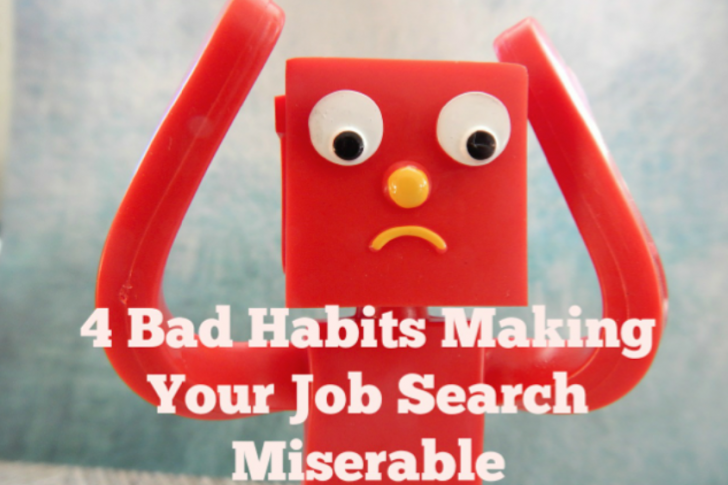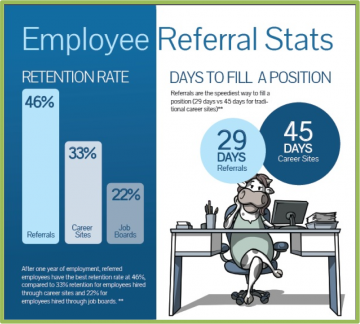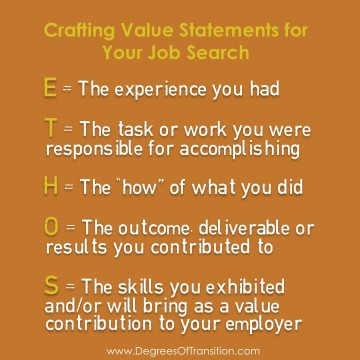Job Corner: 4 Bad Habits Making Your Job Search Miserable
Monday, March 02, 2015

Normally when I work with clients we have a session and they go off, do their thing, and come back the next week. With my son, I saw first hand the personal ups, downs, traumas, and frustrations of a job search. Mostly because he happened to be staying with me temporarily. Long story for another day.
It was frustrating to see him make the same mistakes so many job seekers do. And, I learned so much about the personal trauma a job search could inflict. A recent GoLocalPDX article cited the job search desert for the oldest and youngest job seekers. I got to see some of the big challenges, and debilitating habits that support those kinds of stats, up close and personally.
If you’re among the youngest – or the oldest, for that matter – job seekers, these habits may be hurting you more than job seekers of other ages, given the bias that exists in the workplace. And if you’re a career changer, listen up, because they’re hurting you too.
1. You’re Spending All Your Job Search Time Online
I was shocked my son hadn’t read all my blogs about how you shouldn’t just look online for jobs. This is true especially if you are making a career pivot, which he was.
When you only apply on line, it makes it easy for the system to eliminate you based on small tics in your work experience, poorly composed resumes, keyword malfunctions, weak LinkedIn profiles or the elimination questions in the online form.
If you don’t have a powerful, personal, well-branded online presence and marketing materials, the online world is not your friend.
Referrals make up between 30% and 50% of hires, much more than are hired through job boards. Yet jobseekers make the mistake of spending the majority of their job search time online.
Your takeaway: Spend 20% of your job search effort online, and 80% offline. Block time on your calendar each day to spend time on each. Use your offline energy to find organizations and hiring managers that are a good match for you, and use your networking magic to go after them, build relationships, and be in the talent funnel when positions become available.

2. You Don’t Know How to Translate Experience into Employable Skills
This is a huge factor in job search failure. Take a look at your resume or LinkedIn, and see if it’s just a list of tasks that you’ve completed in your job.
Does it address accomplishments you’ve achieved? Does it include quantified results of those accomplishments? Does it talk about the impact you had on the organization and how you added value?
If not, your messages aren’t focused on telling an employer how you’re going to help them win. Which, if you think about it, is the only reason anyone is going to hire you.
Your job search messages have to be able to provide evidence of what you have done, so that you can tell your next employer what you will do. And there’s logical reason on their part to believe you.
Your takeaway: Inventory your experience and determine how what you have done, prepares you for what you can do. My ETHOS method for doing so will help you get from here to there. Then, practice how you’ll talk about your experience, re-framing it so you have a convincing case for the next manager to give you due consideration.
3. You Aren’t Leveraging Your Relationships
When you’re among the youngest or oldest job seekers – or you’re making a career change, your relationships are your most important job search asset.
The online search process makes it too easy to get yourself eliminated. But since so many jobs are placed via referrals, and employers tend to like them better. This is because they fill jobs more quickly with referrals, and the people they hire tend to stay longer than with other types of recruitment.
4. You’re Taking it Personally
Two words my son used to describe the job search were ‘brutal’ and ‘humbling.’
It is hard work to do a job search. Even more so if you’re younger, older, or making a career pivot.
Part of the job search being ‘brutal’ is that it involves so much rejection. So much trying and then ultimately failing – when an offer doesn’t come through, when someone doesn’t connect with you on LinkedIn, when someone doesn’t return your phone call.
It is SO EASY to question your competence, your ability, and your greatness.
But I urge you not to.
You might be tempted to let some unprofessional hiring manager determine your sense of self worth. Instead, remember this is a process where so much is simply not within your control, that it makes it even more important to control what you can.

Managers are trying to make good hiring decisions with incomplete information in an imperfect system. And just because they don’t choose you, try to avoid taking it personally.
Instead, acknowledge that the job search can indeed by a hard thing to do.
Give yourself credit for making that call to follow up after an interview (which he did constantly, but don’t even get me started on managers who bring you in for an interview, and then never tell you of their decision!). Pat yourself on the back for reminding that contact about the information they committed to sending and didn’t.
And when you come to a “rejection bump” in the road, give yourself a couple minutes to grieve about it, and then have a plan to move on.
Your takeaway: You may not get the job, and there are many reasons for that – which you may never know. But don’t take it personally. Treat all these decisions professionally and with a positive attitude. The world is small and you never know when you may cross paths with someone again – and the opportunity could be perfect. It’s one of the reasons I encourage job seekers to work in small groups – so you have a support committee when you get those disappointing calls.

If you’re struggling to write a great resume in your job search, check out her Resume Coloring Book + E-course. Hundreds of job seekers have found a newfound sense of confidence in their resumes, and 90% get more interviews, faster!
Related Articles
- Job Corner: 6 Strategies For Your Bully Boss
- Job Corner: Are You A LinkedIn Loser?
- Job Corner: Don’t Write a Crappy LinkedIn Headline
- Job Corner: Resume Templates Are Killing Your Job Search
- Job Corner: Why Your Boss is a Bully





 Delivered Free Every
Delivered Free Every
Follow us on Pinterest Google + Facebook Twitter See It Read It